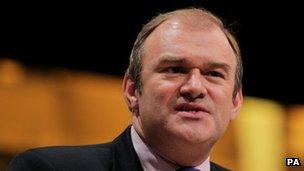On-shore wind policy 'must be sensible' - energy secretary
- Published

Mr Davey said the coalition partners would agree a "settled energy policy"
Ed Davey has said he does not want to see wind turbines "all over the countryside" but they have an important role to play in future energy supply.
The Lib Dem energy secretary has clashed with his Conservative deputy John Hayes over the amount of on-shore wind developments required in future.
Mr Hayes has said no projects should go ahead beyond those in the pipeline.
But Mr Davey told MPs he disagreed with his colleague and insisted he was "in charge" of coalition energy policy.
Investors have warned of confusion over government policy after Mr Hayes claimed last month that once those wind projects currently being built or seeking planning consent were completed "enough would be enough".
Appearing before the Commons energy select committee, Mr Davey said the amount of power generated from on-shore wind would continue to increase as part of efforts to reduce carbon emissions and achieve a diverse energy mix.
'Get on well'
He told MPs he "got on well" with Mr Hayes but they disagreed on the issue and he had been "prescient" to take responsibility for renewable energy strategy away from him when he was appointed to the department in September's reshuffle.
"I did not agree with what he said. I have tried to reassure people that that is not the case and that is not the policy."
Asked about the government's strategy, Mr Davey said on-shore wind farms with potential generating capacity of a seven gigawatts (GW) were currently seeking planning consent, in addition to eleven gigawatts of plant either already built or approved.
"I do not believe that all that seven GW will end up getting consented," he said. "There is a quite high attrition rate of some of these planning permissions. I can't predict exactly where we will end up - I am not in charge of local planning."
But he insisted the UK was on target to meet the expectation - set out in its renewable "roadmap" - of the scale of on-shore wind's contribution to UK energy by 2020.
"There is no cap and no limit on it but we want to pursue onshore wind in a sensible way," he said.
"I really don't want to see on-shore wind all over the English countryside, I don't want that at all. But I do think there are parts of the country that are more welcoming than others for on-shore wind and I think they should get the benefit from that."
Energy bill
Amid reports of divisions between the Conservatives and Lib Dems MPs, ministers have been urged to set clear targets for clean energy in 2030 in the government's forthcoming energy bill.
Mr Davey said he personally believed that such a move was "attractive" but he would not pre-judge discussions in government ahead of the bill's publication next week.
"I do not apologise for discussing with my coalition colleagues to get to a settlement where we can say to parliament, to industry and the world, that this coalition government now has a settled position on energy policy."
It has been claimed that firms will only invest enough in new renewables if the 2030 target is fixed in future legislation.
The BBC's environment analyst Roger Harrabin said chancellor George Osborne rejects the target and the coalition was seeking a compromise acceptable to the Lib Dems such as committing to the principle but leaving details until after the next election.
The energy secretary told MPs that the coalition partners would agree a settled policy and "both parties would support it".
- Published31 October 2012
- Published31 October 2012